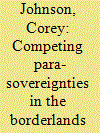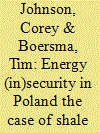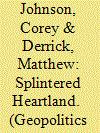|
|
|
Sort Order |
|
|
|
Items / Page
|
|
|
|
|
|
|
| Srl | Item |
| 1 |
ID:
156825


|
|
|
|
|
| Summary/Abstract |
This article is broadly concerned with how we conceptualise the geography of the tensions between the nominally stable orders of the modern state system against the turbulence of the past few decades in relation to that order, especially in the realm of border controls. Specifically, it considers the rescaling and relocation of border enforcement in the European Union in relation to state sovereignty. The article argues that existing “soft” conceptualisations of the EU’s relationship to sovereignty and bordering—“shared,” “joint,” “multi-level,” “consociational”—are inadequate to understand the transformations of exercises of sovereign power in European borderlands. Instead, we are witnessing the emergence of competing para-sovereignties acting within the same spaces, with both traditional states and the incipient state-like EU fulfilling particular bit roles in realms that were traditionally viewed as the exclusive responsibilities of modern, sovereign, territorial states. This dynamic is made visible in recent years in observing individual humans negotiate and subvert the fluid political geographies of European border space. Examples are taken from the activities of the EU border agency Frontex in southeastern Europe.
|
|
|
|
|
|
|
|
|
|
|
|
|
|
|
|
| 2 |
ID:
117338


|
|
|
|
|
| Publication |
2013.
|
| Summary/Abstract |
The large scale extraction of natural gas from shale rock layers in North America using hydraulic fracturing, or "fracking", has prompted geologists, economists and politicians in various parts of the world to ask whether there are new reserves of this precious resource to be found under their soils. It has also raised a host of questions about the potential environmental impacts of extracting it. Drawing on research on both sides of the Atlantic, this paper assesses the most pressing issues for research and policy makers related to shale gas extraction. The paper first provides a survey of environmental and economic issues related to shale gas. It then turns to a case study of Poland, whose policy makers have been among the most fervent proponents of shale gas development in the European Union. We examine the status of shale gas extraction in that country and what the barriers are to overcome before commercial extraction can in fact take place, if at all.
|
|
|
|
|
|
|
|
|
|
|
|
|
|
|
|
| 3 |
ID:
115038


|
|
|
|
|
| Publication |
2012.
|
| Summary/Abstract |
Much has been made about a revival of Mackinderian geopolitics in Eurasia, largely centred on struggles over access to energy resources and rooted in a territorial understanding of space. This paper proposes that the conceptual political cartography of Eurasia is indeed largely being rewritten, but conventional understandings of space, territory, and resources are insufficient in providing insight into a changing geopolitics. We interrogate the geographical logics of Russia's role as energy provider to Europe by focusing specifically on the provision of gas to Europe via Nord Stream, a new underwater pipeline that is scheduled to go online by late 2011. Drawing on debates in human geography on relational/topological views of space, and on the "splintering urbanism" thesis, the paper describes a rapidly evolving networked space that effectively "splinters" the territorial integrity of the region and thereby complicates notions of Eurasian geopolitics that emphasise proximity, territorial hegemony, and state-centric international relations.
|
|
|
|
|
|
|
|
|
|
|
|
|
|
|
|
|
|
|
|
|